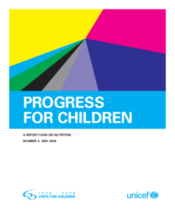Eradicating extreme poverty and hunger, reducing child mortality and achieving all the Millennium Development Goals (MDGs) related to health and education are largely dependent on progress in nutrition. If undernutrition is not successfully addressed, it will be difficult to reach the other MDGs. Every year, it is estimated that undernutrition contributes to the deaths of about 5.6 million children under the age of fi ve. One out of every four children under five – or 146 million children in the developing world – is underweight for his or her age, and at increased risk of an early death.
When nutrition falls short, damage is done to individuals and to society. When pregnant women are not adequately nourished, their babies are born at low weights, putting their survival at risk. When girls are undernourished, their future ability to bear healthy children is threatened. Undernutrition and micronutrient deficiencies can lead to developmental delays throughout childhood and adolescence, making individuals less productive as adults.
This report card – the fourth in a UNICEF series that monitors progress for children towards the MDGs – measures the world’s performance on nutrition, taking the prevalence of underweight among children under five as its primary indicator. The global community promised to cut the proportion of underweight children by half between 1990 and 2015, but we are still not on track to reach that target.
This report card shows clearly that the world must alter its priorities in order to reach the MDG target of reducing child undernutrition by half. But it shows just as clearly that reducing undernutrition is attainable if the lessons of the past 15 years are applied. The goal could not be more important: a world in which children live free from poverty and hunger.
©UNICEF

